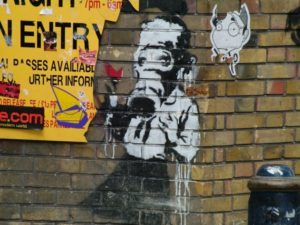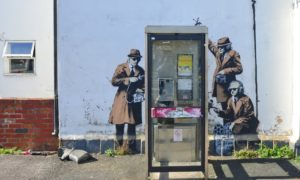In this section, we shall consider what it means to think analytically. But this, I mean breaking down a topic and then reconstructing it to provide a new perspectives on something. I am especially interested in statements that have this form: “If I think this…., then this…..”
Our goal in reflecting on the topics below will be to consider the relationship between our conceptions of Hell and human behavior. My basic proposition is that the way we define the world will have important implications for how we should act.
Consider these issues:
- What do we mean when we speak about the “human condition”?
- What do we mean when we speak about “human nature”? Is human nature the same thing as the human condition?
- Does it matter whether there continue to be different conceptions of Hell in our society?
- How is our conception of Hell related to our moral options?
16. Thursday, March 21
To facilitate this discussion, I am asking you to read two of the most vivid chapters from Fyodr Dostoevsky’s The Brother’s Karamazov. As you read the chapters, ask yourself: what is Ivan Karamazov’s “argument” about the human condition? What do you make of his recommendations as expressed through the Grand Inquisitor?
- An excerpt from Fyodr Dostoevsky, The Brothers Karamazov Ivan Karamazov’s sobering thoughts on “Rebellion” and the poem of the Grand Inquisitor: 236-263 (HAND-OUT); or find the entire book on this link, The Brothers Karamazov PRINT AND READ pp. 296-332. ***
- “Chemical Attack in Syria” READ
The Science of Free Will: Can we change the human condition by exercising our Free Will? Do we even have Free Will?
*** No self-respecting Notre Dame student should graduate without reading The Brothers Karamazov in its entirety. The book will change the way you look at life.
IMAGE SIX
UTILITARIANISM: “HELL BY NUMBERS”
18. Tuesday, March 26
Peter Singer, “Taking Life: Humans,” from Practical Ethics (HAND-OUT)
Harriet Johnson, “Unspeakable Conversations” PRINT AND READ
“Catholic Social Teaching and the Dignity of the Human Person” PRINT AND READ
For this discussion, I recommend that you surf around for a very general understanding of the philosophical approach known as “utilitarianism.” You do not need to learn about the different forms or schools of utilitarianism. Singer’s work a lot will give you a good sense of this philosophical approach.
As you read Singer’s work, consider an alternative perspective on human worth that is reflected in the passage from Jacques Maritain below. Maritain was one of the greatest Catholic philosophers of the twentieth century and the intellectual father of Vatican II:
“Let us think of the human being, not in an abstract and general way, but in the most concrete possible, the most personal fashion. Let us think of this certain old man we have known for years in the country—this old farmer with his wrinkled face, his keen eyes which have beheld so many harvests and so many earthly horizons, his long habits of patience and suffering, courage, poverty and noble labor, a man perhaps like those parents of a great living American statesman whose photographs appeared some months ago in a particularly moving copy of a weekly magazine. Or let us of think of this certain boy or this girl who are our relatives or our friends, whose everyday life we well know, and whose loved appearance, whose soft or husky voice is enough to rejoice our hearts . . . . We perceive intuitively, in an indescribable not inescapable flash, that nothing in the world is more precious than one single human being.”
—Jacques Maritain, “The Immortality of Man” (1941)
“Loving Donation”: BROWSE THROUGH ALL OF THE PAGES ON THIS SITE
Let’s Design Better Babies: READ
“Mary had a little lamb” RECITE
19. Thursday, March 28
NO CLASS
I will be in Lublin, Poland. The Catholic University of Poland is awarding me an honorary doctorate.
20. Tuesday, April 2
The Second Great Debate!
Topic: “When it comes to human dignity, Singer is far more humane than the Roman Catholic Church”
–Relevant sections of the Vatican’s “Compendium of the Social Doctrine of the Church”: PRINT AND READ
Your second writing assignment is HERE

Banksy, “Monet’s Garden”
IMAGE SEVEN
PRONOUNCEMENTS AND THREATS: “GO TO HELL!”
21. Thursday, April 4
In this section, I want to explore the connection between our understanding of hell and moral behavior. I am interested in addressing two questions: 1) Can we be good without Hell (i.e., Do we need to believe in Hell to maintain a civilized society?)? 2) Or will belief in Hell lead us to worse behavior?
In preparation for this discussion, please think about this question: On what basis does humanity learn to do the “right thing”?
- Jerry Walls: “Can we be Good without Hell?” PRINT AND READ
- Elie Wiesel, Nobel Prize Speech: PRINT AND RE-READ
- Bishop John Henry Spong, “Hell is an invention of the church” WATCH AND TAKE NOTES
- On religion in general: Richard Dawkins, “Religion’s real child abuse” (handout)
- Belief in Hell and Criminality: READ. For background on this fascinating research: SCAN
- Our Values Survey: An assessment of your findings about your personal beliefs (please bring your copy of the Values Survey to class)
22. Tuesday, April 9
Music from Hell: It’s no surprise that there is a direct relationship between what musicians (and other artists) have to say about Hell and how they expect people to act. How many songs in the following genres invoke the concept of Hell?: Metal, punk, heavy rock, existential rock, grunge, rap, the blues. Comparatively speaking, how many invoke the concept of heaven?
- PRINT AND READ: Compare John Lennon‘s lyrics in “Imagine” with Kurt Cobain’s lyrics in ”Lake of Fire“
- LISTEN: “Imagine” and “Lake of Fire“
- The People’s Choices: Your nominations will be HERE when you post them.
For today’s discussion, please bring 19 copies of the lyrics of a song which, in your view, best captures both the meaning of Hell and its implications. All musical genres are acceptable. Nothing is forbidden. I am not afraid of words.
IMAGE EIGHT
POVERTY: “POOR AS HELL”
ROMANS 15:1 “We who are strong have an obligation to bear with the failings of the weak, and not to please ourselves.”
23. Thursday, April 11
Discussion:
J. D. Vance, Hillbilly Elegy Read at least the first half of the book.
Compare Vance’s argument with Sarah Smarsh, “Liberal Blind Spots Are Hiding the Truth About ‘Trump Country” PRINT AND READ
A review of Robert Putnam, Our Kids: The American Dream in Crisis PRINT AND READ
24. Tuesday, April 16
Discussion:
J. D. Vance, Hillbilly Elegy Finish the book.
1. Trump and the the American Poor
Ken Stern, “Inside How Trump Won the White Working Class” PRINT AND READ
NOTE: Please leave your technology at home. This includes electronic devices of any kind, such as laptops, i-Pads, cell phones, Kindles, x-Boxes, clouds, video cameras, or other personal digital devices
